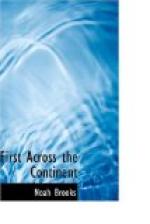A day or two later, the journal has this significant entry: “On parcelling out the stores, the stock of each man was found to be only one awl, and one knitting-pin, half an ounce of vermilion, two needles, a few skeins of thread, and about a yard of ribbon—a slender means of bartering for our subsistence; but the men have been so much accustomed to privations that now neither the want of meat nor the scanty funds of the party excites the least anxiety among them.” To add to their discomfort, there was a great deal of sickness in the camp, owing to the low diet of the men. Sacajawea’s baby was ill with mumps and teething, and it is suggested that the two captains would have been obliged to “walk the floor all night,” if there had been any floor to walk on; as it was, they were deprived of their nightly rest. Here is an example of what the doctors would call heroic treatment by Captain Clark, who conducted all such experiments:—
“With one of the men (Bratton) we have ventured an experiment of a very robust nature. He has been for some time sick, but has now recovered his flesh, eats heartily, and digests well, but has so great a weakness in the loins that he cannot walk or even sit upright without extreme pain. After we had in vain exhausted the resources of our art, one of the hunters mentioned that he had known persons in similar situations to be restored by violent sweats, and at the request of the patient, we permitted the remedy to be applied. For this purpose a hole about four feet deep and three in diameter was dug in the earth, and heated well by a large fire in the bottom of it. The fire was then taken out, and an arch formed over the hole by means of willow-poles, and covered with several blankets so as to make a perfect awning. The patient being stripped naked, was seated under this on a beach, with a piece of board for his feet, and with a jug of water sprinkled the bottom and sides of the hole, so as to keep up as hot a steam as he could bear. After remaining twenty minutes in this situation, he was taken out, immediately plunged twice in cold water, and brought back to the hole, where he resumed the vapor bath. During all this time he drank copiously a strong infusion of horse-mint, which was used as a substitute for seneca-root, which our informant said he had seen employed on these occasions, but of which there is none in this country. At the end of three-quarters of an hour he was again withdrawn from the hole, carefully wrapped, and suffered to cool gradually. This operation was performed yesterday; this morning he walked about and is nearly free from pain. About eleven o’clock a canoe arrived with three Indians, one of whom was the poor creature who had lost the use of his limbs, and for whose recovery the natives seem very anxious, as he is a chief of considerable rank among them. His situation is beyond the reach of our skill. He complains of no pain in any peculiar limb, and we therefore think his disorder cannot be rheumatic, and his limbs would have been more diminished if his disease had been a paralytic affection. We had already ascribed it to his diet of roots, and had recommended his living on fish and flesh, and using the cold bath every morning, with a dose of cream of tartar or flowers of sulphur every third day.”




